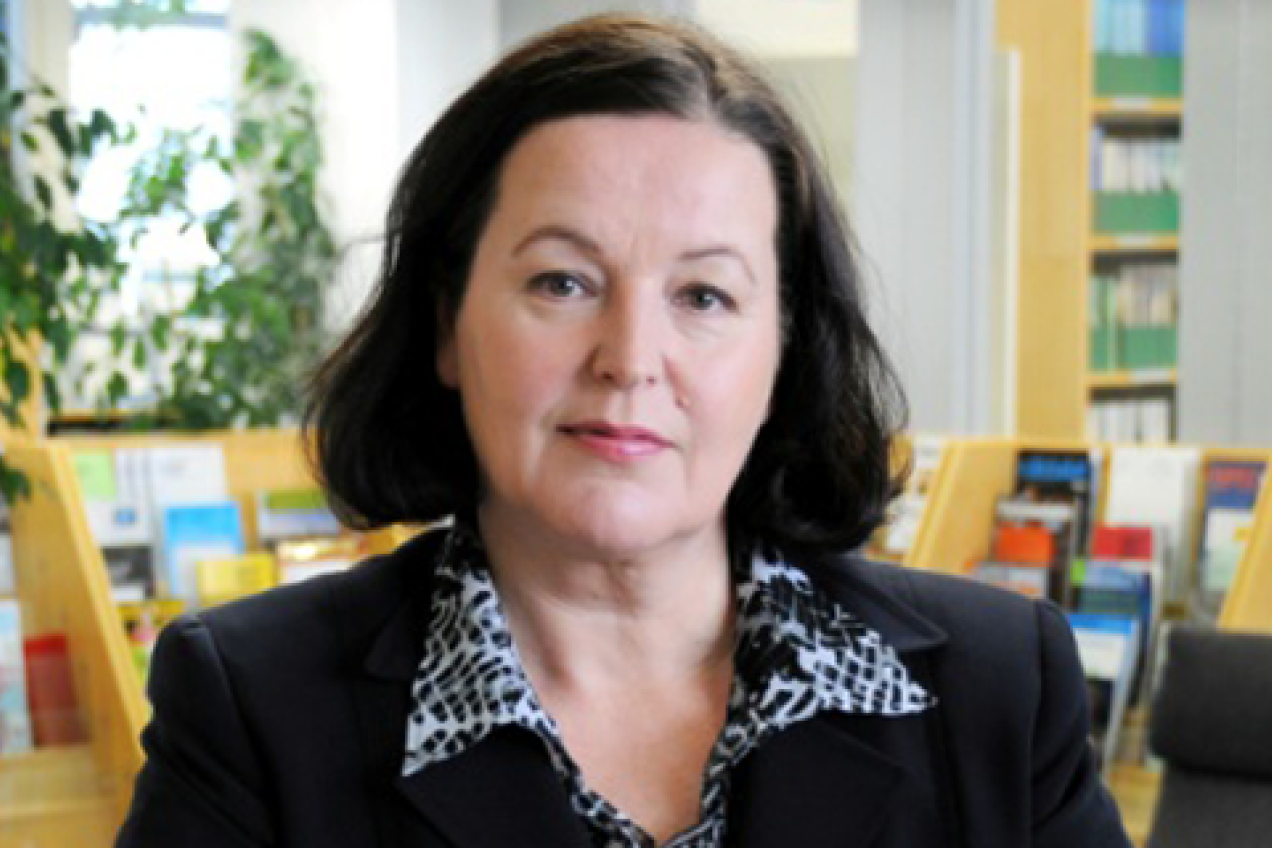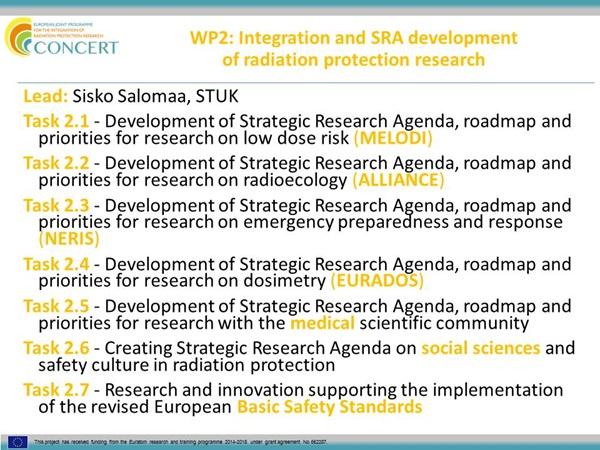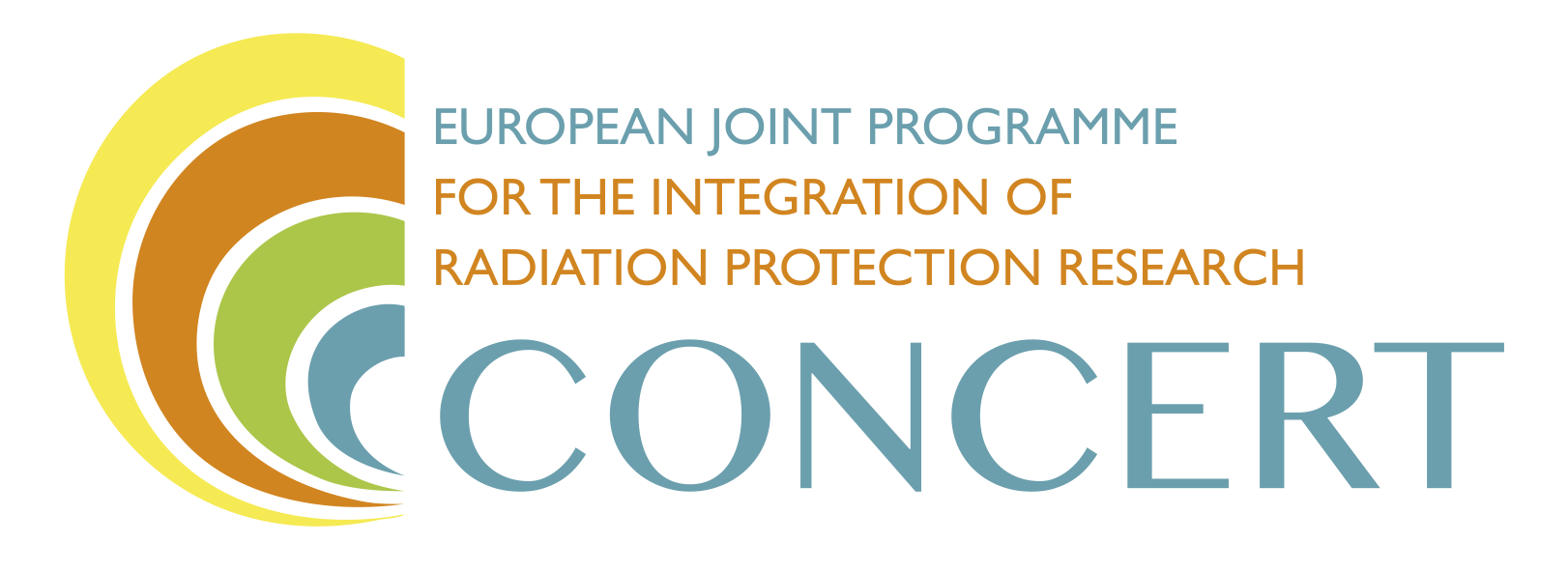SRA development
Lead: Sisko Salomaa, UEF, Finland
Contact: Sisko [dot] salomaa [at] uef [dot] fi


Objectives
WP2 aims to bring together the European research community in order to enhance radiation protection knowledge. The four European research platforms (MELODI, ALLIANCE, NERIS, EURADOS) will maintain and update their Strategic Research Agendas (SRA), respectively, in a coordinated manner and prepare annual statements on current research needs, priorities and road maps for joint programming (WP3). The platforms prepare roadmaps with a long-term view and identify research priorities with a shorter term perspective in their respective areas and explore joint interests for multidisciplinary and synergistic research. The activities also make use of the existing expertise in Europe regarding medical use of ionizing radiation, with the aim to include radiation protection relevant topics in the SRA of MELODI and EURADOS. Another activity is to make sure that scientific knowledge from outside the radiation protection field will be integrated. Furthermore, it is explored how social and human sciences, including ethical developments and communication issues, could contribute to the consolidation of European radiation protection culture, bringing together human perceptions and behaviour with science and technology. Agendas for research and innovation supporting the implementation of the revised European Basic Safety Standards will also be developed.
The research platforms are open for new memberships. Attraction of research organizations and universities from countries not yet involved in radiation protection research on the European level receive a high priority on the agenda of the research platforms.
Description of work and role of partners
-
The four first tasks in CONCERT WP2 are similar by nature, and their purpose is to develop the Strategic Research Agendas, roadmap and priorities for research on low dose risk, radioecology, emergency preparedness and response and dosimetry.
The tasks are being led by the respective platforms, together with their SRA working groups (or, R&D committee in NERIS). The beneficiaries and Linked Third Parties (LTPs) involved are those participating on the SRA work.
Task 2.1 - Development of Strategic Research Agenda, roadmap and priorities for research on low dose risk (Lead: MELODI; Partner: BfS, MTA-EK, DH-PHE, HMGU, IRSN, STUK, ENEA, UniPv, CEA; LTPs: CTU-FBME, CREAL, SU)
Task 2.2 - Development of Strategic Research Agenda, roadmap and priorities for research on radioecology
(Lead: ALLIANCE; Partners: IRSN, SCK-CEN, BfS, STUK, HMGU, CEA and CIEMAT; LTPs: HZDR)Task 2.3 - Development of Strategic Research Agenda, roadmap and priorities for research on emergency preparedness and response
(Lead: NERIS; Partner: BfS, SCK-CEN, DH-PHE, VUJE, IRSN, CIEMAT, NRPA, STUK; LTPs: DTU, CEPN, KIT, MUTADIS)Task 2.4 - Development of Strategic Research Agenda, roadmap and priorities for research on dosimetry (Lead: EURADOS; Partner: HMGU, IRSN, SCK-CEN, CIEMAT, DH-PHE, ENEA, ISS; LTPs: PTB, IFJ, SL, RBI, IST)
Each platform will maintain and update the SRA in a coordinated manner with other platforms and prepare annual statements on current research needs for Joint Programming (WP3). A long-term roadmap will be developed, shorter-term research priorities will be identified and joint interests for multidisciplinary research will be explored.
Key activities are:
- The SRAs are revised on a 5-year basis.
- During the SRA period, each platform prepares a SRA-statement is prepared and discuss by open consultation. This consultation will be finalized during the annual platform meeting or a series of sessions covering different themes.
- A long-term roadmap for research is developed by each platform
- Annually, short-term research priorities are elaborated by each platform
- Providing input to Joint Programming (WP3)
-
Task 2.5 - Development of Research Agenda, roadmap and priorities for research with the medical scientific community
In addition to the SRA’s of the established platforms (low dose risk, radioecology, emergency preparedness and response and dosimetry), the WP2 also supports the development of the research agenda, roadmap and priorities for research in the medical scientific community. As part of the OPERRA project, it is being explored how to enhance radiation protection activities related to the use of ionizing radiation in medicine, in particular with relevance to public health. These are widely used imaging techniques, however, also procedures with higher doses based on X-ray imaging (CT, angiography), nuclear medicine procedures, and therapeutic procedures where secondary effects in healthy tissue are of concern. European professional organizations dealing with medical use of ionizing radiation (ESR, EFOMP, ESTRO, EANM, and EFRS) have signed MoU with MELODI and EURADOS, with the intention to cooperate on SRA development and to set up joint working groups to define joint research priorities addressing radiation protection research relevant for medical use of radiation.
Taking into account these developments, CONCERT actions in this field are structured in two successive integrative steps, divided in sub-tasks 2.5.1 and 2.5.2:
2.5.1 Transition research agenda and road map for inclusion of medical radiation protection research goals in the first open CONCERT RTD call.
(Lead: UniPv; Partner: MUW, BfS, IRSN, NRPA, STUK, ISS; experts from medical professional organizations and medical institutes)
The first priority for CONCERT in this field is to ensure that the first open RTD call of CONCERT reflects adequately the needs and priorities of the medical scientific community with respect to radiation protection in medicine. Task 2.5 aims to establish, in time for inclusion into the work of WP3 and WP4, contributive elements to the programme for the first open CONCERT RTD call, taking into account work done previously within the OPERRA project.
Key activities are:- Identifying research needs and priorities of each of the medical groups and developing a transition SRA for radiation protection in medicine.
- Identifying common research areas in the medical SRA and the SRAs of MELODI (health) and EURADOS (dosimetry) in order to facilitate the establishment of the first CONCERT RTD call
- Providing input to WP3.
2.5.2 Sustainable integration of the medical radiation protection research perspective into the wider radiation protection research SRA
(Lead: BfS; Partner: UniPv; MUW, IRSN, NRPA, STUK, ISS, MELODI, EURADOS; experts from medical professional organizations and medical institutes)
The field of research in radiation protection in medicine will evolve in importance for the future work of CONCERT with the inclusion of specific medical oriented objectives. On the other hand, other SRA elements established through existing platforms such as MELODI or EURADOS will benefit from the input of the medical scientific community (e.g. new cohorts, markers for radiation effects in radiation biology). New objectives and integrative actions will therefore have to be defined, with a larger and specific involvement of partners in the medical field together with other parts of the radiation protection research community, particularly in the low dose area. This will ensure that this field of research becomes sufficiently integrated in the work programme of CONCERT in time for the second RTD call. Task 2.5.2 will take over from Task 2.5.1 when preparations for the second open CONCERT RTD call start. In view of its impact on the development of the whole CONCERT project, the lead will be allocated to the CONCERT Coordinator organization.
Key activities are:
- Organizing meetings with the European professional associations active in medical radiation research and with an interest in radiation protection, in conjunction with existing research platforms to integrate radiation protection research objectives in medical research pro-grammes in a wider and more inclusive way and vice versa in the SRAs of the existing re-search platforms in particular of MELODI and EURADOS.
- Cooperating with other WP2 and WP3 tasks in order to ensure a sustainable inclusion of medical related RTD needs and RTD capabilities into the overall work programme of CON-CERT, with a view to contributing to a consolidated SRA in time for the preparation of the second CONCERT RTD call.
- Consulting key stakeholders in connection with CONCERT WP5 activities.
-
Task 2.6 - Creating Strategic Research Agenda for Social Sciences and humanities in Radiation Protection
(Lead: SCK-CEN; Partner: IRSN, BfS, EEAE, ISS, NRPA, VUJE, IMROH; LTPs: MUTADIS, CEPN, NMBU, UMLI)
An interactive process will be developed with the research community and other stakeholders for creating a strategic research agenda dedicated to the integration of social sciences and humanities in radiation protection research. There are two motivations in the task 2.6: The first one is to stimulate an ethics of reflexivity on the interaction between nuclear science and society, the degree to which radiation protection research responds to social and ethical concerns and how this can be stimulated and enhanced. The second one is integration of social sciences and humanities in radiation protection research. These motivations include a broad spectrum of research topics. Specific focus will be laid on the responsibility of science with respect to the justification of the radiation risk, radiation risk communication, radiation risk perception, and safety culture.
The OPERRA project has already developed ties with social and human sciences, identifying issues and institutions carrying out research in the fields of ethics of nuclear technology assessment, risk communication and risk perception.
Furthermore, at the European level, the European ALARA Network has been working since a few years on ALARA culture and participating to the work of the International Radiation Protection Association (IRPA) on radiation protection culture. Building on these experiences, CONCERT will further explore the needs and possibilities to integrate social sciences and humanities in the development and consolidation of European radiation protection research, thus bridging between science, technology and society. A SRA will be developed for this research area, in close interaction with platforms and research communities addressed by tasks 2.1—2.4 (NERIS, ALLIANCE, EURADOS, medical field).
Key activities are:
- Organizing meetings with professional groups with expertise in social sciences and humanities and radiation protection
- Identifying joint research needs and priorities
- Preparing the first version of Strategic Research Agenda
- Consulting key stakeholders
- Providing input to Joint Programming (WP3)
For this purposes, three subtasks will address ethics and justification (2.6.1), risk communication/perception (2.6.2) and safety culture (2.6.3). The subtasks partners will consult experts from research institutes and universities outside of consortium in order to ensure sharing of knowledge and the highest level of general development (“state of the art”). They will also consult key stakeholders on these topics, making use of professional networks, contacts through national or international projects as well as already existing platforms and FP7 projects in the field: (e.g. FP7 EAGLE communication platform about ionizing radiation).
Subtask 2.6.1. Ethics and justification
The aim of subtask 2.6.1. ‘Ethics’ is to organise a ‘pilot exercise’ of self-inquiry with the researchers involved in the CONCERT project. The outcome of that exercise is supposed to be a proposal for an ethical value framework for research in radiological protection, taking into account the possibilities and limitations of science to provide ‘evidence’ for justification, that could inform a future strategic research agenda.
Subtask 2.6.2. Risk communication and risk perception
The subtask 2.6.2 ‘Risk communication and risk perception” brings together and engage a radiation protection community, academia from social sciences and humanities and other stakeholders (e.g. patients associations) in order to identify new research needs for improved communication practice and mutual understanding of beliefs, views and feelings about radiological risks and benefits as well as radiation protection . Interaction and trans-disciplinary exchange of practices and needs in all fields of application of ionising radiation will be organised in forms of workshops, round tables, reflection groups and questionnaires in different consortium members countries.
Subtask 2.6.3. Safety culture
The subtask 2.6.3 ‘Safety culture” will engage the radiation protection research networks, the European ALARA Network, the national and international radiation protection associations, the medical and nuclear industry and the academia, in order to identify new research needs in the field of safety culture, in particular radiation protection culture, and more broadly safety governance. The results of the process will help formulating research topics to be included in the strategic research agenda for social sciences and humanities. -
Task 2.7 – Research and innovation supporting the implementation of the revised European Basic Safety Standards
(Lead: NRIRR; Partner: STUK, IRSN, BfS, VUJE, ISS, RIVM, IMROH, UT; LTP: NRI)
Due attention will be paid to the communication of knowledge from research and innovation conducted within CONCERT and outside laying the scientific basis for the revised European Basic Safety Standards. This will be done to help those who are involved in the transposition and implementation of these Basic Safety Standards, which will require changes in national regulations and practices. Further, topics and priorities for research will be identified in workshops bringing together the research platforms and national authorities and regulators. In particular, HERCA and EURATOM Article 31 group of experts will be consulted. This Task will serve as input for the definition of integrative activities.
Key activities are:
- Organizing meetings with EC and national authorities, regulators and Technical Support Organizations (TSOs) to explain the scientific basis of the BSS and to consult on research and innovation needs related to the revision of BSS and its implementation in member states
- Identifying research needs at national level and identifying priorities for European R&D
- Providing input to Joint Programming of integrative research actions (WP3)
- The CONCERT activities on Research and innovation supporting the implementation of revised Basic Safety Standards will be coordinated with other relevant workshops and HERCA activities exploring the implications.
